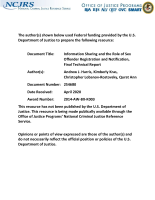State laws
Information Sharing and the Role of Sex Offender Registration and Notification, Executive Report
The Impact of State-Level Firearms Laws on Homicide Rates by Race/Ethnicity
TECHBeat, November 2019
TECHBeat, July/August 2018
TECHBeat, December 2019
Protecting Against Stress and Trauma - NIJ Research for the Real World Seminar
At this Research for the Real World seminar, NIJ brought together law enforcement practitioners and leading researchers in the field of stress to discuss the current research evidence and practical benefits of targeted stress-management interventions and how they can promote officer mental wellness.
See the YouTube Terms of Service and Google Privacy Policy
Trends in Arrests and Investigative Techniques of Technology-Facilitated Child Sexual Exploitation Crimes: The 4th National Juvenile Online Victimization Study
Kentucky Juvenile Justice Reform Evaluation: Implementation Evaluation Report
National Institute of Justice: Strengthening Science and Advancing Justice
See the YouTube Terms of Service and Google Privacy Policy
Protecting Against Stress & Trauma: Research Lessons for Law Enforcement– Defining the Problem
See the YouTube Terms of Service and Google Privacy Policy
Research to Develop Validated Methods for THC Quantification in Complex Matrices by High-resolution DART-MSFocus on Edibles and Plant Materials
Tribal Justice, Tribal Court: Strengthening Tribal Justice Systems Using Restorative Approaches
Alternative Sentencing Policies for Drug Offenders - Panel at the 2009 NIJ Conference
NIJ Journal Issue No. 264
Spreading the Word on Novel Drugs
Civil Protection Order Enforcement
T.K. Logan discusses her study that looked at the impact of civil protective orders for domestic violence victims in five Kentucky jurisdictions. Civil protective orders, sometimes known as restraining orders, may cover various situations, such as ordering an assailant to avoid a victim's home and workplace or forbidding any contact with the victim, including by mail or telephone.
See the YouTube Terms of Service and Google Privacy Policy
Economical Crime Control: Perspectives from Both Sides of the Ledger
The surge in incarceration since 1980 has been fueled in part by the mistaken belief that the population can be divided neatly into "good guys" and "bad guys." In fact, crime rates are not determined by the number of at-large criminals, any more than farm production is determined by the number of farmers. Crime is a choice, a choice that is influenced by available opportunities as much as by character. This perspective, drawn from economic theory, supports a multi-faceted approach to crime control. Dr.
See the YouTube Terms of Service and Google Privacy Policy
Changing the Behavior of Drug-Involved Offenders: Supervision That Works
A small number of those who commit crimes are heavily involved in drugs commit a large portion of the crime in this country. An evaluation of a "smart supervision" effort in Hawaii that uses swift and certain sanctioning showed that individuals committing crimes who are heavily involved in drug use can indeed change their behavior when the supervision is properly implemented.
See the YouTube Terms of Service and Google Privacy Policy
Benefit-Cost Analysis for Crime Policy
How do we decide how to allocate criminal justice resources in a way that minimizes the social harms from both crime and policy efforts to control crime? How, for that matter, do we decide how much to spend on the criminal justice system and crime control generally, versus other pressing needs? These questions are at the heart of benefit-cost analysis.
See the YouTube Terms of Service and Google Privacy Policy
Just Wrong: The Aftermath of Wrongful Convictions
The strength of our criminal justice system depends on its ability to convict the guilty and clear the innocent. But we know that innocent people are sometimes wrongfully convicted and the guilty remain free to victimize others. The consequences of a wrongful conviction are far-reaching for the wrongfully convicted and the survivors and victims of the original crimes.
See the YouTube Terms of Service and Google Privacy Policy
Backlogs and Their Impact on the Criminal Justice System
Evidence backlogs have been known to be an issue in crime laboratories. A recent study published by NIJ has shown that backlogs of untested evidence are also an issue in law enforcement evidence storage. This panel will discuss the issues and present preliminary findings from a study of the Los Angeles Police Department's and Los Angeles County Sheriff's Department's experience with clearing out a large backlog of unanalyzed rape kits.
Cell Phones in Prison
Criminals are using cell phones illegally in prisons and jails to conduct their business and intimidate witnesses. Although technology solutions to this problem are available, they can create new challenges, such as legal and implementation issues associated with cell phone use in correctional facilities. Panelists will discuss various aspects to consider from how prisoners use cell phones, to day-to-day and operational aspects, to legal and regulatory concerns.
International Organized Crime: Recent Developments in Policy and Research
Since 2008, DOJ has been reviewing its policies and programs on international organized crime, with the goal of strengthening law enforcement's response to this threat. In this NIJ Conference Panel, the speakers will explore how DOJ and other U.S. government agencies are responding to it. Attendees will learn more about the Attorney General's Organized Crime Council, the International Organized Crime Intelligence and Operations Center, and the recent National Intelligence Estimate on International Organized Crime.
Special Technical Committees: How They Are Changing NIJ's Standards Development Process
NIJ has established a new standards development process based on Special Technical Committees whose members include practitioners, scientists, researchers, subject matter experts, staff of test laboratories and major criminal justice stakeholder organizations, and representatives knowledgeable in standards development and conformity assessment. The members collaborate to develop the standard and ensure that practitioner needs are addressed.


